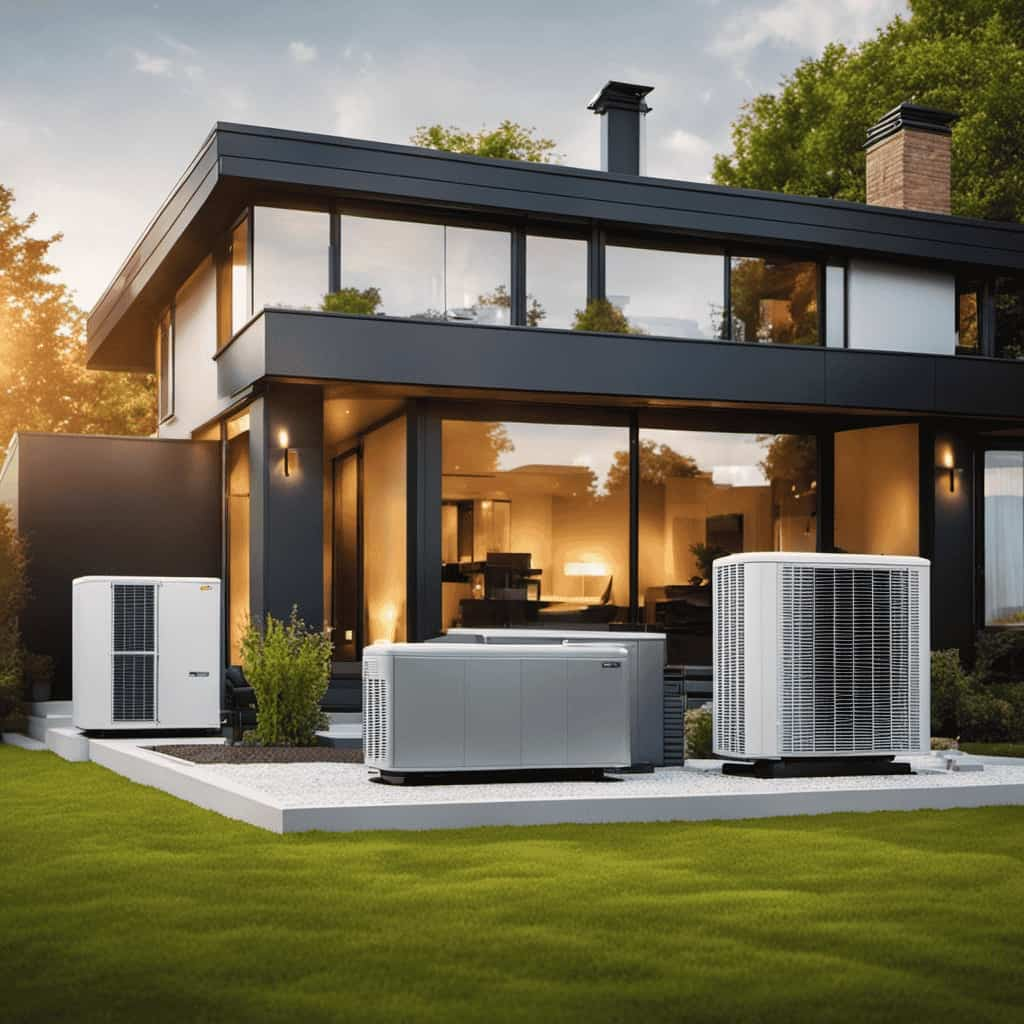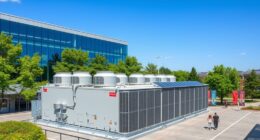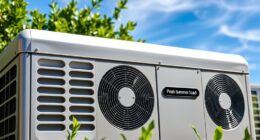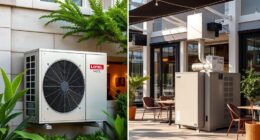We are here to show you how you can take advantage of the benefits of home heat pumps.
With their energy efficiency, cost savings, and improved indoor air quality, heat pumps are a versatile and eco-friendly solution for heating and cooling your home.
By using heat pumps, you can not only save money but also contribute to a healthier environment.
Let us guide you through the technical details and help you serve your home better with residential heat pumps.

Key Takeaways
- Energy efficiency and cost savings: Utilize advanced technology for better control and optimization of energy usage, achieve significant cost savings on energy bills, and heat pumps consume less energy compared to traditional systems.
- Improved indoor air quality: Filtration captures and removes airborne particles, ventilation systems reduce indoor pollutants, dehumidification prevents mold and mildew growth, and UV-C lights kill bacteria and viruses.
- Heating and cooling versatility: Provide efficient and reliable heating and cooling throughout the year, extract heat from outdoor air or ground for heating, remove heat from indoor air for cooling, and regular maintenance and cleaning prolong system lifespan.
- Environmental and economic benefits: Reduce carbon footprint and greenhouse gas emissions, promote renewable energy integration, heat pumps have a long lifespan and require minimal maintenance resulting in lower costs, and incentives and rebates are often available for homeowners who install heat pump systems.
Energy Efficiency of Residential Heat Pumps
We can maximize the energy efficiency of residential heat pumps by utilizing advanced technology and proper maintenance. By doing so, we not only achieve significant energy savings but also reduce our carbon footprint.
Advanced technology in heat pump systems allows for better control and optimization of energy usage. This includes features such as variable-speed compressors and smart thermostats, which adjust the heating and cooling output based on the specific needs of the home.
Additionally, regular maintenance is crucial in ensuring optimal performance. This includes cleaning or replacing filters, checking refrigerant levels, and inspecting the system for any leaks or malfunctions.
Cost Savings With Residential Heat Pumps
By utilizing residential heat pumps, homeowners can achieve significant cost savings on their energy bills. These cost savings are a result of the energy efficiency of heat pumps, which consume less energy compared to traditional heating and cooling systems. Heat pumps work by transferring heat from one area to another, rather than generating heat themselves, making them a more efficient option. This not only reduces energy consumption but also lowers utility bills. Additionally, residential heat pumps are a long-term investment that pays off over time. Although the initial installation costs may be higher, the savings on energy bills make it a worthwhile investment in the long run. To illustrate the potential cost savings, refer to the table below:

| Heating System | Annual Energy Cost |
|---|---|
| Electric Furnace | $1,200 |
| Gas Furnace | $900 |
| Heat Pump | $600 |
As shown in the table, a heat pump can save homeowners up to $600 annually compared to an electric furnace and $300 compared to a gas furnace. This demonstrates the significant cost savings and long-term financial benefits of using residential heat pumps.
Improved Indoor Air Quality With Heat Pumps
One of the main benefits of heat pumps is that they can significantly improve indoor air quality. This is achieved through several mechanisms that enhance air purification, providing health benefits for the occupants.
Here are four ways in which heat pumps contribute to improved indoor air quality:
-
Filtration: Heat pumps utilize advanced air filters that capture and remove dust, pollen, pet dander, and other airborne particles, reducing the presence of allergens in the air.

-
Ventilation: Heat pumps can incorporate ventilation systems that exchange stale indoor air with fresh outdoor air, ensuring proper circulation and reducing the buildup of indoor pollutants.
-
Dehumidification: Heat pumps can remove excess moisture from the air, preventing the growth of mold and mildew, which can cause respiratory problems and allergies.
-
UV-C Sterilization: Some heat pumps are equipped with UV-C lights that kill bacteria, viruses, and other pathogens, further enhancing air quality and reducing the risk of illnesses.
Heating and Cooling Versatility of Residential Heat Pumps
The residential heat pumps offer a versatile solution for both heating and cooling needs in our homes. These systems are designed to provide efficient and reliable heating and cooling performance throughout the year.

When it comes to heating, residential heat pumps extract heat from the outdoor air or ground and transfer it into our homes. This process is reversed during cooling mode, where the heat pumps remove heat from the indoor air and release it outside.
The heating and cooling performance of residential heat pumps can be influenced by various installation considerations. Proper sizing, placement, and insulation are important factors to ensure optimal performance and energy efficiency.
Additionally, regular maintenance and cleaning of the heat pump system are essential to maintain its performance and prolong its lifespan.
Environmental Benefits of Using Heat Pumps in Residential Spaces
We can significantly reduce our carbon footprint by incorporating heat pumps into our residential spaces. Heat pumps offer a range of environmental benefits that contribute to reducing carbon emissions and promoting renewable energy integration. Here are four key advantages:

-
Energy efficiency: Heat pumps operate by transferring heat from one area to another, rather than generating heat from scratch. This process requires less energy compared to traditional heating and cooling systems, resulting in reduced greenhouse gas emissions.
-
Renewable energy integration: Heat pumps can be powered by renewable energy sources such as solar or wind power, further minimizing carbon emissions and dependence on fossil fuels.
-
Reduced air pollution: By using heat pumps, we can significantly decrease the combustion of fossil fuels, which in turn leads to a reduction in harmful air pollutants, improving air quality and public health.
-
Climate change mitigation: The adoption of heat pumps in residential spaces plays a crucial role in mitigating climate change. By reducing carbon emissions, we contribute to slowing down the global warming process and creating a more sustainable future.

Frequently Asked Questions
How Does the Installation of a Residential Heat Pump Affect the Value of My Home?
Installing a residential heat pump can significantly increase the value of our home. Not only does it improve energy efficiency, but it also leads to substantial cost savings for homeowners.
Are There Any Government Incentives or Rebates Available for Installing a Residential Heat Pump?
Are there any government incentives or rebates available for installing a residential heat pump? We’ve researched this extensively and can confirm that there are indeed various incentives and rebates offered by the government to promote the adoption of residential heat pumps.
Can a Residential Heat Pump Be Used in Conjunction With a Traditional Furnace or Air Conditioning Unit?
Yes, you can use a residential heat pump in conjunction with a traditional furnace or air conditioning unit. This allows for efficient heating and cooling throughout the year, maximizing comfort and energy savings.
How Long Does a Residential Heat Pump Typically Last Before Needing to Be Replaced?
Residential heat pumps typically last 15-20 years before needing replacement. Signs of a failing heat pump include reduced heating or cooling capacity, increased energy consumption, and frequent breakdowns. Regular maintenance can extend the lifespan.

Are There Any Potential Health Risks Associated With Using a Residential Heat Pump?
Potential health risks associated with using a residential heat pump include noise pollution and air quality issues. However, the energy efficiency benefits outweigh these concerns. Regular maintenance and proper installation can minimize any potential risks.
Conclusion
In conclusion, residential heat pumps offer numerous benefits that are just too good to pass up. Who wouldn’t want to save on energy costs, breathe cleaner air, and enjoy the versatility of heating and cooling all in one system?
Plus, let’s not forget the environmental advantages of reducing carbon emissions. It’s like having your cake and eating it too, except in this case, the cake is a cozy home and the eating is enjoying all the benefits of a heat pump.









